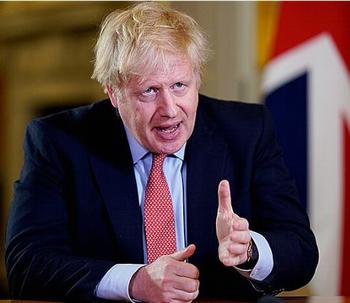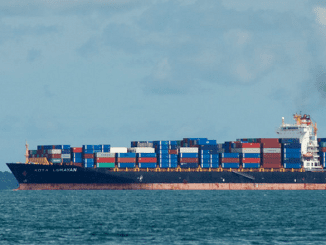
LONDON, UK, April 6, 2020 (ENS) – British Prime Minister Boris Johnson was moved to an intensive care unit in a London hospital Monday after his coronavirus symptoms “worsened,” the Prime Minister’s office said in an official statement. A spokesman said he was moved on the advice of his medical team and is receiving “excellent care.”
Johnson has asked Foreign Secretary Dominic Raab to deputize “where necessary,” the spokesman said.

The prime minister, 55, was admitted to St. Thomas’ Hospital with “persistent symptoms” on Sunday evening. Johnson was initially taken to hospital for routine tests after testing positive for coronavirus 10 days ago. His symptoms included high fever and a cough.
Intensive care is the unit where doctors look after the sickest patients. Johnson’s admission to intensive care is the clearest sign of how sick the prime minister really is.
Queen Elizabeth has been kept informed about the prime minister’s health by his office at No. 10 Downing St., according to Buckingham Palace.
BBC political correspondent Chris Mason said the prime minister was given oxygen late Monday afternoon, before being taken into intensive care.
He has not been put on a ventilator.
The statement from the Prime Minister’s Office says, “The PM is receiving excellent care, and thanks all NHS [National Health Service} staff for their hard work and dedication.”
Raab said there was an “incredibly strong team spirit” behind the prime minister.
Raab said he and his colleagues are making sure they implemented the plans Johnson had instructed them to deliver “as soon as possible.”
“That’s the way we’ll bring the whole country through the coronavirus challenge,” he said.
Labour leader Sir Keir Starmer described it as “terribly sad news.”
“All the country’s thoughts are with the prime minister and his family during this incredibly difficult time,” he said.
President Donald Trump said Americans “are all praying for his recovery.”
Trump described Johnson as “a very good friend of mine and a friend to our nation” who is “strong” and “doesn’t give up”.
Scotland’s First Minister Nicola Sturgeon said she is “sending [Mr Johnson] every good wish,” while Northern Ireland’s First Minister Arlene Foster said she was “praying for a full and speedy recovery.”
Wales’ First Minister Mark Drakeford called it “concerning news.”
Today across the world, the number of confirmed COVID-19 cases stands at 1,214,466; there were 77,445 new cases reported today. Worldwide, 67,767 people have died of the virus and there are 211 countries, areas or territories with cases, according to the World Health Organization.
In the United Kingdom, from February 1 to date, there have been 47,810 confirmed cases of COVID-19 with 4,934 deaths.
On March 23, Prime Minister Johnson addressed the nation, saying, “Without a huge national effort to halt the growth of this virus, there will come a moment when no health service in the world could possibly cope; because there won’t be enough ventilators, enough intensive care beds, enough doctors and nurses. And as we have seen elsewhere, in other countries that also have fantastic health care systems, that is the moment of real danger.”
“To put it simply,” said Johnson, “if too many people become seriously unwell at one time, the NHS [National Health Service] will be unable to handle it – meaning more people are likely to die, not just from coronavirus but from other illnesses as well. So it’s vital to slow the spread of the disease, because that is the way we reduce the number of people needing hospital treatment at any one time, so we can protect the NHS’s ability to cope – and save more lives.
“And that’s why we have been asking people to stay at home during this pandemic,” the prime minister said, after delaying the stay-at-home order for several weeks, reluctant to disrupt the UK economy.
UK residents are only allowed to leave their homes for:
* – shopping for basic necessities, as infrequently as possible
* – one form of exercise a day – for example a run, walk, or cycle – alone or with members of your household;
* – any medical need, to provide care or to help a vulnerable person; and
* – travelling to and from work, but only where this is absolutely necessary and cannot be done from home.
“That’s all – these are the only reasons you should leave your home. You should not be meeting friends. If your friends ask you to meet, you should say No,” said Johnson.
“Each and every one of us is now obliged to join together to halt the spread of this disease, to protect our NHS and to save many many thousands of lives,” he said March 23.
“And I know that as they have in the past so many times,” Johnson said, “the people of this country will rise to that challenge. And we will come through it stronger than ever. We will beat the coronavirus and we will beat it together.”
Copyright Environment News Service (ENS) 2020. All rights reserved.



